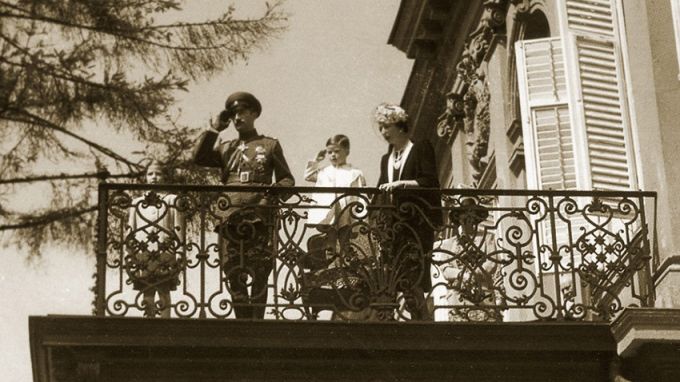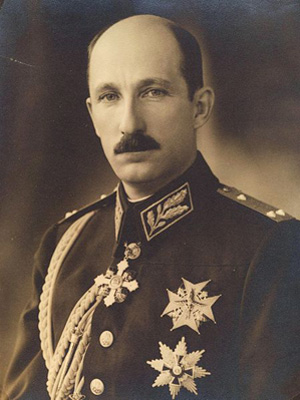
On January 30, 1894 in Sofia, Boris III was born in the palace in Sofia. He was the firstborn son of Knyaz Ferdinand. Since the Saxe-Coburg-Gotha is a German dynasty, while Ferdinand was Bulgarian ruler, the young Boris was baptized by both an Orthodox and Catholic priest. His godparents were the Russian Emperor Nicholas II and Pope Leo XIII. Boris received the title Prince of Turnovo in order to demonstrate continuity with the traditions of the old and glorious Bulgarian kingdoms. Boris put on the king’s crown at the age of 24, after the abdication of his father in 1918.
 “Tzar Boris III sat on the throne after the defeat in World War I", Academician Georgi Markov explains. "Part of the Bulgarian army revolted and the country was facing another national catastrophe. It is not by chance writer and researcher Stefan Gruev titled his biographical book about Boris, "Crown of Thorns”. The beginning of the ruling was extremely difficult. It was the time of the government of the Agrarian Union led by Alexander Stambolijski who had a negative attitude towards the monarchy. Management of the country was entirely in the hands of the executive power. Until the military coup in 1923, Boris himself used to say the Tzar did not have true power to rule. Many government decisions were taken despite the opinion of the king. This is a time of inner tension between the Agrarian Union and other political parties. Howerver, Boris managed to maneuver successfully in this difficult time. Unlike his father Ferdinand, Boris was primarily a man of compromise - both in foreign and home policy. "
“Tzar Boris III sat on the throne after the defeat in World War I", Academician Georgi Markov explains. "Part of the Bulgarian army revolted and the country was facing another national catastrophe. It is not by chance writer and researcher Stefan Gruev titled his biographical book about Boris, "Crown of Thorns”. The beginning of the ruling was extremely difficult. It was the time of the government of the Agrarian Union led by Alexander Stambolijski who had a negative attitude towards the monarchy. Management of the country was entirely in the hands of the executive power. Until the military coup in 1923, Boris himself used to say the Tzar did not have true power to rule. Many government decisions were taken despite the opinion of the king. This is a time of inner tension between the Agrarian Union and other political parties. Howerver, Boris managed to maneuver successfully in this difficult time. Unlike his father Ferdinand, Boris was primarily a man of compromise - both in foreign and home policy. "
In the next decade the figure of the king remained in the shadows. A new military coup in 1934 gave power to the political group of Zveno. Political parties were banned, and the ruler was assigned a puppet role. In 1935 a counter coup made Boris the true head of the Bulgarian state. The Tarnovo Constitution was restored and parliamentary majoritarianism was introduced. For the first time in the country women were given the right to vote. Before the start of World War II, Bulgaria marked indisputable economic and social success. It had stable institutions, quality production, and subsidized agriculture. These were years of progress.
In the midst of coming global conflict Boris pointed out the basic principle of the then foreign policy: "Always with Germany, never against Russia." This seemed as an impossible task, but in the first years of the war Boris III once again managed to maneuver skillfully between the Great Powers. With the help of Germany and the USSR in 1940 he negotiated and signed the so-called Craiova agreement for the return of the lands of Northern Dobruja, lost after the First World War. The agreement, however, had its price. With outstanding diplomatic maneuvers Boris maintained neutrality as long as possible and repeatedly diverted German pressure for entry into the Tripartite Pact, but on March 1, 1941 Bulgaria was forced to join it. However, the king was firm in not allowing Bulgarian soldiers to be sent to the front lines.
Academician Georgi Markov brings more: "You have to give him that credit. Bulgaria, though an ally of Germany and part of the Tripartite Pact, did not cut diplomatic relations with the Soviet Union and did not send troops to the Eastern Front. Not only that, but Ribbentrop urged Bulgaria to send a volunteer legion, following the example of France and Norway and the Bulgarian king did not agree. He skillfully used the Russophile card pointing to Hitler that the Bulgarians are Russophiles and cannot fight on the Eastern Front. Hitler offered to send Bulgarian troops to the front in North Africa, but Boris III refused once again."
In August 1943, a few days after an extremely difficult and hostile meeting with Hitler, King Boris III died unexpectedly of heart failure. The funeral of the monarch was spectacular as he was very popular and loved by the Bulgarian people.
Grateful Bulgaria celebrates the 120 anniversary of the birth of Boris with and exhibition entitled "Bulgaria's brilliance – Palaces and Rulers of the Third Bulgarian Kingdom" in the gallery of the UBA. Great interest is expected to the unique archival photographs of members of the royal family, some of which the public sees for the first time. They are provided by the Archives State Agency and the family of Simeon Saxe-Coburg-Gotha, son of Boris III, as well as by museums in the towns of Shumen and Razgrad, and Austria. The exhibition will be also shown in Chicago, USA.
English version: Alexander Markov
At sunset on December 25, the Jewish community begins to celebrate Hanukkah. The holiday begins on the 25th day of the Jewish month of Kislev in the Hebrew calendar and, depending on the year, can fall in November or December. By lighting 9..
The Bulgarian Orthodox Church celebrates Christmas with solemn services. The festive services began on Christmas Eve, when the church held a solemn vigil. Hundreds of laypeople gathered at the St. Alexander Nevsky Cathedral in Sofia, where..
This year, the holiday of Christmas for the Bulgarian Eastern Orthodox Diocese in the United States, Canada and Australia is especially exciting! Metropolitan Joseph’s long-standing prayers to have his own vicar bishop have come true. His previous..
In anticipation of the Nativity of Christ, the Orthodox Church opens its doors for today's divine services, heralding the fulfillment of the mystery of..
At sunset on December 25, the Jewish community begins to celebrate Hanukkah. The holiday begins on the 25th day of the Jewish month of Kislev in the..
The Bulgarian Orthodox Church celebrates Christmas with solemn services. The festive services began on Christmas Eve, when the church held a solemn..

+359 2 9336 661
